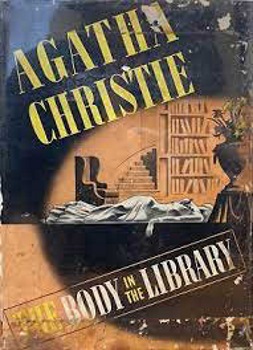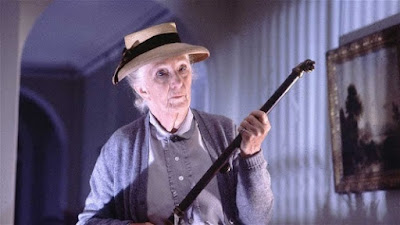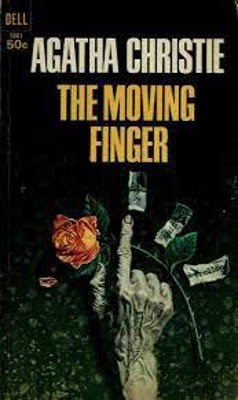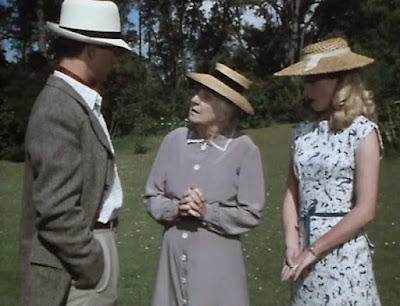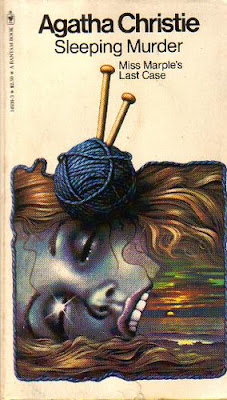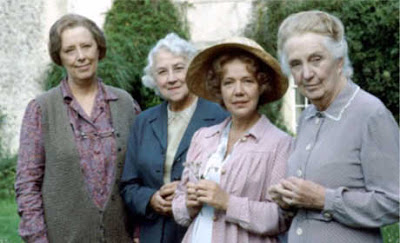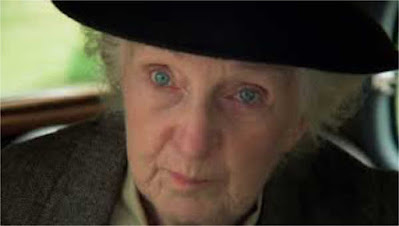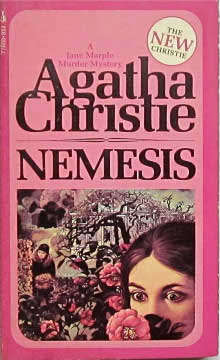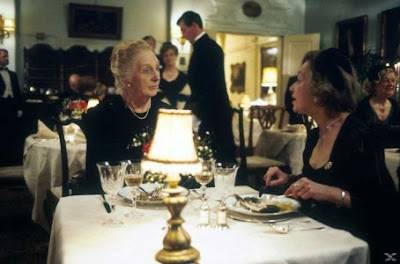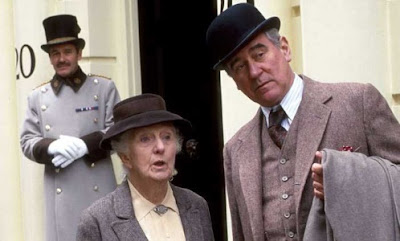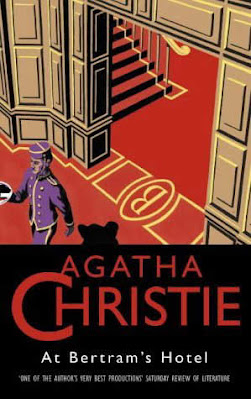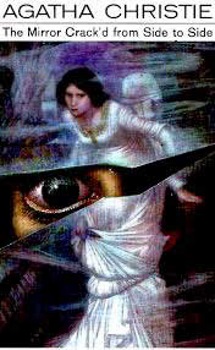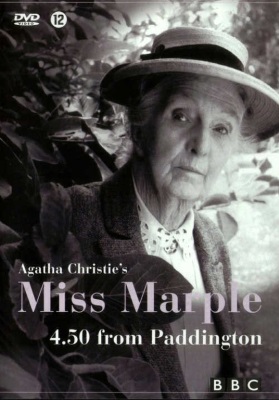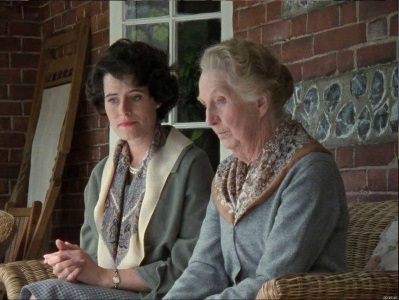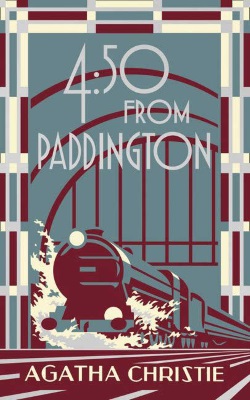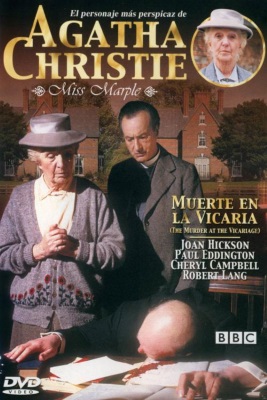Joan Hickson as Miss
Marple - 8 Episodes
Miss Marple: The Body in the Library (1984) -
7.0
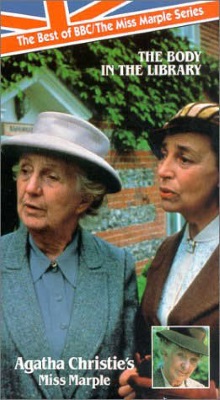
This was the first in the Joan Hickson
adaptations of Agatha Christie's Miss Marple. It was a perfect match and Hickson
was to go on to be Miss Marple in all 12 of the Marple books. This was a
fine start as they give it the deluxe treatment of three parts. It was a
hit immediately with BBC viewers and over time everywhere. The director Silvio
Narizzano does a good job of stretching it out to the 3 episodes without losing
too much of its narrative drive. You can tell Hickson was still getting her
characterization of Miss Marple down but most of it is here in her blank looks,
her piercing blue eyes, her constant knitting, the look as she finally has
figured it out. With Poirot getting a re-make with Branagh, I think it is
time to do the same with Miss Marple. Make her an action figure with her knitting
needles. Or with Miss Marple as a younger woman. She must have had a past.
It is based on a book from 1942 that I read long enough ago that I could
not recall who the murderer was. And I admit I never figured it out.
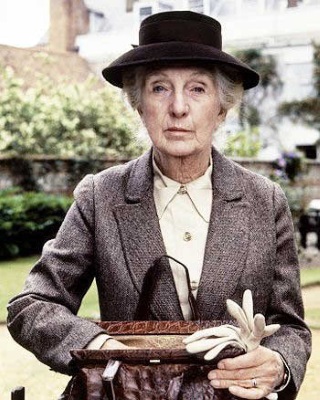
Nice beginning to the film with the maid
opening the curtains early in the morning and finding a dead blonde in the
library. She rushes up four flights in the Manor House to tell the owners
Colonel and Dolly Bantry that they have a dead body downstairs. Their reaction
is perfect as they dither about - not quite believing it - I'm not going down
- you were dreaming. After seeing the body, Colonel tells his wife that she
needs to have some company - the light goes on - yes Jane will know who killed
this person right away. Miss Marple was not a secret within her small village
of St. Mary Meade. Dolly goes to pick her up and people peek out of their
windows as the car from the Manor arrives and then leaves. As the news spreads,
the village folks start to avoid the Bantry's thinking that the Colonel must
have something to do with the girl. Invitations are declined. Being rejected
by society is the worst punishment of all.
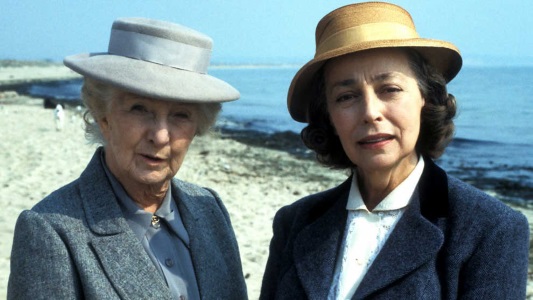
Miss Marple doesn't know who killed the
girl but a few things strike her immediately. She continues to knit and poke
around in her quiet polite way and Dolly keeps asking her, have you figured
it out. To which Miss Marple says not yet. Finally, she says, oh yes, I know
who killed her but I need to pin it down. A clever mystery. Just as a bit
of trivia - Dolly is played by Gwen Watford and in the final episode The Mirror
Crack'd, she reprises her role as Dolly. By this time her affable husband
has passed away and she sells the Manor to the Hollywood actress and again
helps Jane solve the case.
Miss Marple: The
Moving Finger (1985) - 5.0
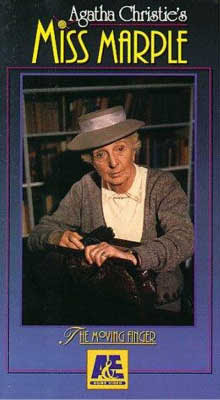
Murder and Poison Pen letters in a small town. Based on a book from Agatha
Christie in 1942 featuring Miss Marple. If you read her series of Miss
Marple books, you realize that evil lurks as much in small towns as cities.
Maybe more so because everyone knows everyone's business and that spawns
hate and envy. It isn't one of my favorite books because Miss Marple doesn't
show up until late in it and quickly solves the case. In this TV episode
of the Joan Hickson series, Miss Marple makes an earlier appearance but just
pops in from time to time. It focuses more on various inhabitants in the
town. It is more a romance than a murder mystery with everyone falling in
love. Well, not Miss Marple. Still when Hickson first shows up coming through
the doorway at the train station, I broke into a big grin. Like seeing an
old friend after a long absence. I have a lot of affection for the Hickson
shows. Two other actresses played Miss Marple in a TV series after her, but
honestly there is only one Miss Marple for me. The steely blue eyes, the
look of perplexment on her face that eventually turns to understanding who
did it and how it was done. Those are the money shots when you realize she
knows.
Someone is sending poison pen letters to residents of the small town
claiming they were doing terrible things. The cleric's wife calls in her
old friend Miss Marple to come. "If anyone can figure out who is doing
this, it is you". She begins to nose about in the most polite of ways. And
then there is of course a murder, and then another one. Scotland Yard ignores
Miss Marple thinking she is a dotty old lady. This mystery seemed too simple
though and instead of the normal denouement at the end, she sets a trap for
the killer. That felt very unlike Miss Marple.
Hickson had been in films since 1934 and every now and then I will come
across her in some old film as a character actor in a small part - landladies,
maids sort of things. Christie saw her in one of her plays on stage - Appointment
with Death - and though Miss Marple was not a character in the play or
book (Hercule Poirot) she wrote to Hickson "I hope one day you will play
my dear Miss Marple." It took another 40 years for that to happen - Hickson
was 78 at the time - though she had a small part in the Margaret Rutherford
Christie film, Murder She Wrote. She was to be Miss Marple in twelve TV
films - which I believe were all the Miss Marple books.
Miss Marple:
A Pocketful of Rye (1985) – 6.0
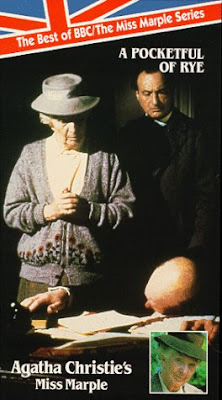
Miss Marple is up to her parlor tricks
again. Unmasking a killer and bringing them to justice. This is generally
a faithful rendering of her 1953 novel of the same name but makes the solution
less complicated and the ending not as effective as in the book. But Joan
Hickson as Marple is as always brilliant. The best part of any of her Marple
TV films is when some off-hand remark makes something click for her and
she suddenly puts the pieces together. She gets this look on her face of
staring off into infinity. It is the money shot. She dithers a great bit
often making no sense to the police but in her dithering is always the truth.
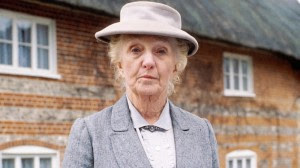
In the book Miss Marple isn't introduced
until over a third of the way into it. Unlike Poirot, Christie often gave
Marple a back seat to other characters though it is of course her who figures
out the jigsaw puzzle and then patiently explains it to the police (Tom
Wilkerson) who initially think of her as an addled pest. In the films though
that won't do and Marple shows up earlier and takes up more room. It is
Hickson that people want to see. The more the better.
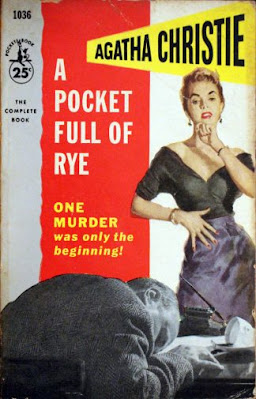
In this one Rex Fortesque dies of poisoning
at his office. He is a wealthy and loathsome being. No one is sorry to see
him dead. Certainly not his family - his young wife, his son and his wife,
not his daughter not the brother who is coming home after being away for
years. But why does he have grains of rye in his pocket? And why did someone
put black birds in a pie? Certainly one of them must be the murderer. Miss
Marple trained their maid Gladys and when another character is poisoned,
a nursey rhyme comes to her mind. She fears that Gladys will be next. And
rushes to try and save her. It is a two-parter of 50 minutes each.
Sing a song of sixpence,
A pocket full of rye,
Four and twenty blackbirds
Baked in a pie.
When the pie was opened
The birds began to sing—
Wasn't that a dainty dish
To set before the king?
The king was in the counting-house
Counting out his money,
The queen was in the parlor
Eating bread and honey,
The maid was in the garden
Hanging out the clothes.
Along came a blackbird
And snipped off her nose.
Miss Marple: Sleeping Murder (1987) -
6.5
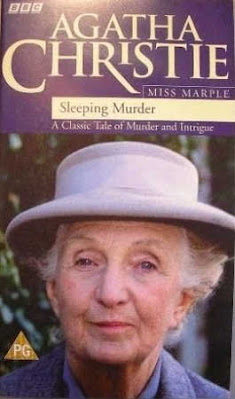
This was the last Miss Marple book to be published in 1976 - after Christie
had died. She wrote it during the Blitz in London and put this and another
book into a safe to be published after her death. One to go to her daughter
and one to her husband. It is the 6th in the Joan Hickson series. Interestingly,
its plot has certain aspects that are in common with The Moving Finger
written in 1942 and which I just watched the other day. In both a young
married couple move to a new town and a new home. They are the central characters
with Miss Marple secondary in terms of screen time and Miss Marple sets
up a trap to catch the killer. Christie must have been upset with
her servants at the time because in both a maid is killed. But both the
book and this film are much better than The Moving Finger. A very intricate
plot and though I figured out the killer, I think that was because I watched
this years ago!
The couple buy a beautiful old house that the wife falls in love with.
She and her husband have just come from New Zealand and it is her first
trip to England. But something is up - she thinks she sees a dead woman on
the floor, she thinks there should be a door in a room and it turns out there
once was. She has hysterics at a play and Miss Marple who is there calms
her down and listens to her story. No, I don't think you are going crazy
- I think you must have lived in that home when you were very young. Miss
Marple is of course right. The couple can't let it go and begin an investigation
into the past involving her father and her step-mother who disappeared one
night. It takes them into murder. Her last words of advice to the couple
are "Don't ever believe anyone". A cynic our Miss Marple.
Miss Marple: Nemesis
(1987) - 7.5
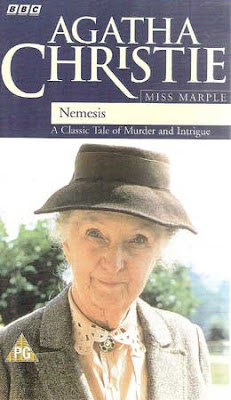
This was the final Miss Marple novel written by Agatha Christie and published
in 1971. There were twelve of them compared to 33 for Poirot. Poirot was
her favorite though at times she felt trapped by his character. I think
over time though that Miss Marple has become the more popular character.
There were the Rutherford films of course, two with Helen Hayes and then
beginning with Joan Hickson three different TV series that covered most
of her books three times and in some cases they invented a few more. There
is just something about this quiet elderly lady living in a small very
British village who solves murders with her steel trap of a mind and being
able to compare things to life in a village. Evil is everywhere. She senses
it around her. But to all her friends and neighbors she is just a little
old lady, scatter-brained at times and often knitting. But she believes
in justice and morality.
No where more than this film. One character says of her "She is an avenging
angel". This has a very clever plot - out of the ordinary in that she has
to solve a murder that took place some years before. There are no clues
as she just ingests what everyone says to her and figures it out. This may
be my favorite of the Hickson adaptations. Besides being very good, Hickson
is in nearly every scene as compared to some of the others where Marple
pops in and out. Those that are fans of the series are fans because of
Hickson. I noticed today that she has 222 credits on IMDB. I would love
to see her in the TV Mini-Series Great Expectations in which she plays
Miss Havisham.
In this one she receives a letter from an old friend, Jason Rafiel, a
very wealthy businessman who she met in a Caribbean Mystery - played by Donald
Pleasance in that one. He is dying and knows it and by the time Miss Marple
gets his letter, he has died. In the letter he asks her to solve one more
mystery for him. He calls her Nemesis. He tells her practically nothing
- just to go on a bus tour of England's great houses (which looked like
a very nice tour). He credits her by saying she will figure it out as the
tour progresses. She slowly does. It has to do with his son who was suspected
of a murder of a young girl and disappeared and he is now a tramp (in the
book, he was found guilty and is in jail). With mere fragments of conversations
she gets closer and closer. The final scene is rather marvelous as she faces
the killer.
Miss Marple: At
Bertams Hotel (1987) - 6.0
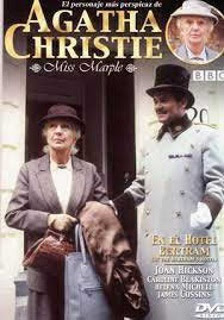
Miss Marple (Joan Hickson) spends a pleasant fortnight at Bertram's Hotel
in London and solves a murder and breaks up a crime ring. Just an ordinary
week in the life of this spinster from the small village of St. Mary Meades.
Bertram's is an old-fashioned hotel with an older well-off loyal clientele
with a wonderful tea in the afternoon that serves pastries filled with cream
or jams. Seed cake is their specialty. There is one small black and white
TV for the entire hotel in the communal room and there are other tucked away
comfy rooms for people to talk. Or eavesdrop in high back chairs. Miss Marple's
nephew thought she needed some time off from her quiet village and paid
for a fortnight at Bertram's. But what is an elderly lady to do to fill
her time. Snoop of course. Stick her nose in where it doesn't belong. What
she does best.
As soon as Miss Marple arrives, she sits, knits, observes and gossips
with an old friend Lady Selina, played by Joan Greenwood. Greenwood was
one of England's finest actresses in the 1940s and 50s appearing in such
classics as Whiskey Galore, Kind Hearts and Coronets, The Man in the White
Suit and Tom Jones. In her late 60's now, she still has this remarkable
voice that seems as if honey syrup and gasoline were poured down her throat.
She has the inside scoop on everyone and fills Miss Marple in. It takes
a very long time before anything actually happens as Miss Marple just waits
and watches and listens - and in one case even follows one of the hotel
guests.
She can't put her finger on it but senses that something is wrong in this
old hotel. As she tells a Scotland Yard copper (George Baker) who is trying
to stay undercover but can't fool the old lady, "nothing ever changes in
this hotel and there is something wrong in that". This was written by Christie
in 1965 and perhaps by then she was looking for more than what were termed
"cozy mysteries" and so has an ending that takes it out of that sub-genre
into another - but not sure it works. This was very leisurely in its pacing
and was just what I look for when I can't decide what I want to watch and
my ambitions are low.
Miss Marple: They
Do It with Mirrors (1991) – 5.5
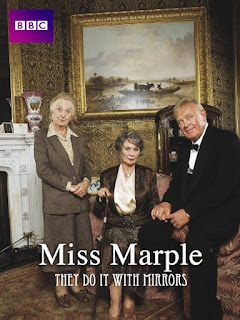
I have gotten into the habit of reading
an Agatha Christie novel and then finding a film of it. Theatrical if possible
but a TV film if not. This is from the series with Joan Hickson as Miss
Marple. It was 12 episodes for the 12 Miss Marple novels and ran from 1984
to 1992. Hickson and the filmmakers finally got Miss Marple right. Margaret
Rutherford of course played Marple in the four fun films in the 1960's but
her portrayal of the character is absurdly comic and eccentric. Angela Lansbury
took her on in The Mirror Crack'd in 1980 but that was a bloated film full
of stars and Lansbury was closer to her character in Murder, She Wrote than
Miss Marple. But Hickson is perfect, quietly observing everything, her light
blue eyes in thoughtful repose. That moment when you know she has figured
out who the killer is is told in her eyes.
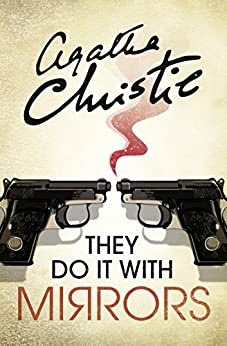
Hickson was 78 years old when she first
played Miss Marple and was 86 when she filmed the last one. She had been
in film since 1934 playing secondary roles in films and TV. She is recognizable
even in her early films but she was never an attractive woman and the roles
she got affirmed that. In an odd twist, when Christie saw her in one of
her plays in the 1940s, she wrote Hickson a note saying "I hope one day
you will play my dear Miss Marple". By 1984 her appearances had dwindled
down to one or two a year though in 1980 she was Miss Havisham in a mini-series
adaptation of Great Expectations. I will have to look for that. BBC had
decided to make a series of Miss Marple films and wanted to play them straight.
Thankfully, they chose Hickson. She was to make one small appearance after
her last Miss Marple film and then retired. But that was not to be the end
of Miss Marple.
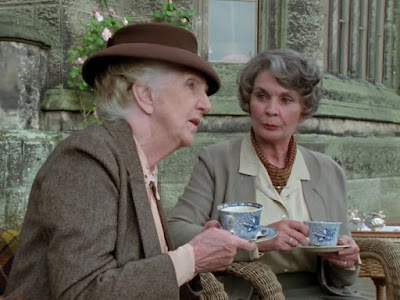
In 2004 another TV series was begun first
starring Geraldine McEwan (2004–2008) and then Julia McKenzie (2009–2013)
as Miss Marple. They cover the same 12 novels but then oddly insert Miss
Marple into Christie books where she didn't belong. For example, she appears
in a Tommy and Tuppence story - who had had their own TV series back in 1983.
Or Ordeal with Innocence, a very good Christie novel but nothing to do with
Miss Marple. I have only seen a few of these - McEwan is lacking in energy
and McKenzie has too much of it.
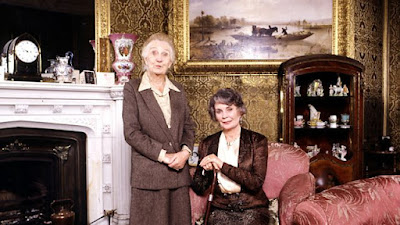
They Do It with Mirrors struck me as
one of Christie's lazier works. She fills it with police interviews of the
suspects and then the ending is awful because there is no classical denouement
of Miss Marple telling everyone who the killer is. That is always the best
part. It was also clearly obvious to me who the killer had to be. The film
corrects this. Tightens it up. Has the denouement. Has that look come into
her eyes and the Inspector sees it as well - "You know who the killer is
don't you?" "Yes". And it moves quickly enough so that the guilty party
is not so easy to pick out - though of course I knew from the book!
It takes place as so many of Christie's
novels do among the upper crust - no gasoline attendant murders for her
- when a friend of Miss Marple asks her to visit her wealthy sister because
she senses something is wrong but has no idea what it is. Just a feeling.
The sister is played by Jean Simmons and her husband by Joss Ackland. An
extended family is living there from various marriages. Another member of
the extended family arrives unexpectedly. He is murdered the same night.
Who had a motive? Who had opportunity? Seemingly no one had both.
Miss Marple: The
Mirror Crack'd from Side to Side (1992) - 7.0
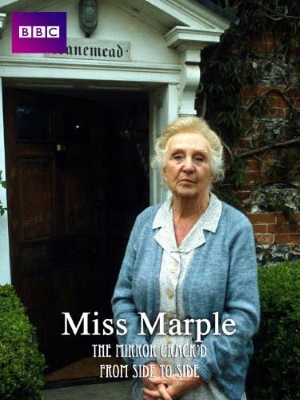
St. Mary Meade. As charming a small English
village as one could imagine. Right out of an Enid Blyton book. Vicars on
bicycles pedaling down narrow lanes, English gardens full of roses and irises,
tea shops with crumpets and blueberry muffins. The sound of the church bells
on a Sunday morning. And of course murder. In the heart of this idyllic town.
Fortunately, there is an elderly lady with suspicious eyes and a knack for
detecting evil. Miss Marple loves her garden and doddering over a cup of tea
where the gossip flows like a magical fountain. But nothing like a
good juicy murder to solve. She takes murder personally. Especially in her
village. The village manor has been purchased from her good friend Dolly Bantry
and the owners are now a famous actress (Claire Bloom), her husband (Barry
Newman) and the usual staff of hot and cold running servants.
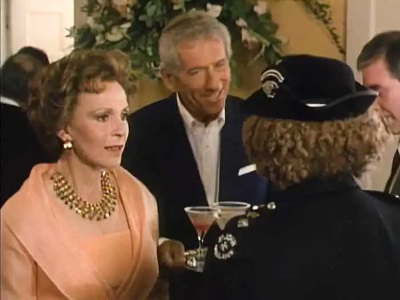
A fête is given on the grounds for
the common folks with Punch and Judy, children’s games and English puddings
and tarts. Mrs. Badcock in particular is thrilled to see the actress Marina
Gregg while the rest of the ladies are more interested in the newly renovated
marble bathrooms. Mrs. Badcock takes a drink and dies from poison. But why
would anyone want to murder a stout middle-aged woman of no-account. Was the
poison really meant for Marina? The police in this case immediately go to
Miss Marple. One of the better whodunits in the Miss Marple series. I knew
the killer having seen the 1980 film with Angela Lansbury as Miss Marple and
read the book, but I am reasonably sure I didn’t have any idea the first time.
This is quite well-done and much better than the stodgy 1980 film which was
too loaded down with stars – Tony Curtis, Rock Hudson, Elizabeth Taylor, Kim
Novak, Edward Fox and Geraldine Chaplin. This one has no stars but all the
actors are perfect for their roles. As a tiny bit of trivia if you are ever
on Jeopardy some sunny day – the actress who plays Miss Marple’s maid (Margaret
Courtenay) played Mrs. Bantry in the 1980 version. This was the final Miss
Marple made with Hickson.
Miss Marple: The
Murder at the Vicarage (1986) - 6.0
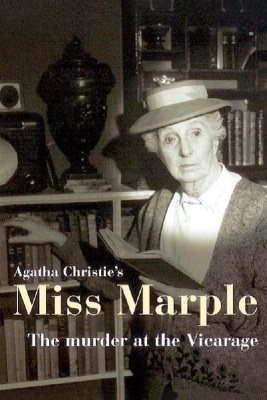
"Oh, he knew that I was the noticing type.
He was counting on that". Yes, the noticing type. Otherwise known as the
village busybody. This was the first Miss Marple novel written in 1930 by
Christie and the fifth in the Joan Hickson TV series. I put it on pause just
as the killer was going to be revealed and decided to solve it myself. Not
based on wild guesses or the least likely suspect but on using my gray cells
and going through the clues. Let's see. Hmmm. Only two people seem to have
a good motive and they have the perfect alibi. Miss Marple herself. “Tinker,
tailor, soldier, sailor, Rich man, poor man, beggar man, thief.”. I had no
idea and guessed. And was right as usual. I should have been a TV detective.
The armchair type.
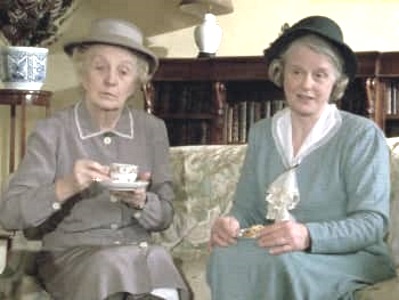
This one feels very British - the hapless
Vicar (Paul Eddington), his slightly dizzy wife who holds older lady gossip
sessions (of which Miss Marple partakes), the barking easy to anger owner
of the Manor House, his wife who takes the brunt of his grumpiness and the
daughter modeling in a bathing suit for the disreputable painter, the maid
who can't cook, the lady who recently moved in and a doctor. A doctor was
the killer in another Miss Marple book. Would she do that again I wondered?
The wealthy man gets killed in the study of the Vicar's home with a pistol
at his side. It sounds like Clue. Who is Mr. Mustard? Poor Inspector Slack
(David Horovitch) is back again and lets out a groan of frustration when
he realizes the murder has taken place in St. Mary Meade. Oh no, that means
you know who will be underfoot. And solves the killing of course. I needed
this after watching a violent action film. A nice easy-going murder with
not a drop of blood shown.




